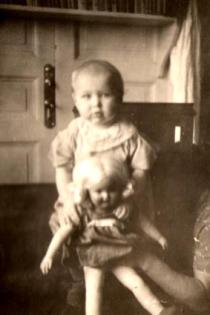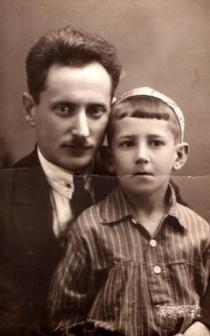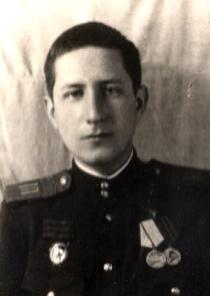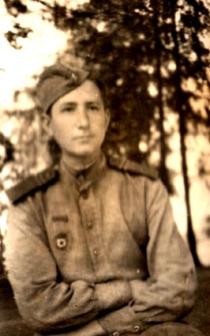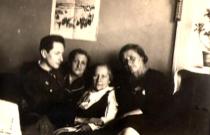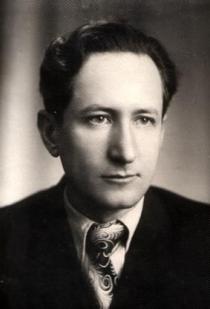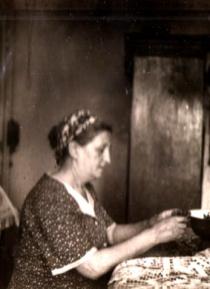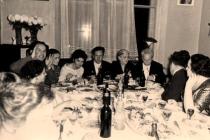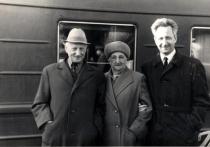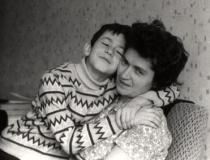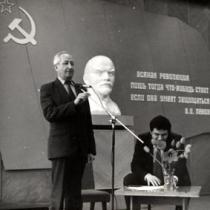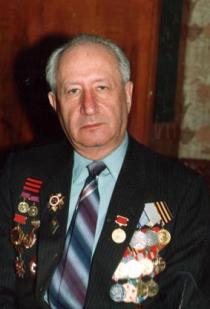The picture was made at home at the festive dinner on the occasion of my wedding. My wife Tatiana Kotina and I are in the center. My mother Berta Kotina and my father Moses Kotin are to the right from me. To the left to Tatiana is her mother Praskoviya Shamrai. The photograph was taken in Moscow in 1961.
On the 1st of September 1946 I started my studies in Moscow Engineering and Physics Institute. I became an engineer- metallurgist. I had worked in that field until retirement. I had worked in the Central Institute of Machine Buildingfor 13 years, since 1953. Then in 1966 the elderly retired and the management changed, so I had to come across anti-Semitism once again. Without any grounds I was transferred from the position of the leading engineer to the position of the chief engineer. It was a lower position and much lower salary. I decided to change my job. I was known as an expert and had quite a few publications. I addressed to one of the institute and filled in the form there, but I was not scheduled the interview. Finally, my acquaintance, director of the department at the Institute of Steel and Alloys, also by the ministry of defense industry, offered me a job there but with a lower salary. I agreed to it. Gradually I got a pay rise and my salary was even higher than at a previous job.
I met my future wife when I worked at the institute of defense industry. Tatiana Shamrai got a mandatory job assignment after graduation from Higher Technical School named after Bauman, the so-called Bauman institute to work as appliances designer. Tatiana is Russian. She was born in the village of Starinki, Kaluga oblast in 1931. Her father Mikhail Shamrai was a farmer and mother Praskovia Shamrai was a housewife, and also helped her husband with the field work. There were five children in the family.Tatiana was the youngest one. With the outset of collectivization the family moved to Moscow. Father worked as a janitor and mother worked at Caoutchouc plant in the most hazardous plant- where degreasing of metallic constructions in cyanic solutions took place. It was a hard living, but two daughters Anna and Tatiana got higher education. Tatiana was really gifted. She, a village girl, finished school with gold medal, entered the institute named after Bauman and brilliantly graduated from it. She was loved by everybody at work. When we met, soon I understood that she was the one for me: a clever and healthy village girl. We got married in 1961. My parents were not against that my wife was Russian. Nationality was not important for them. We had a common wedding: got registered in the state registration office and in the evening our friends came over to mark the event. I moved in Tatiana's place. She had a small room in the communal apartment. Her siblings were married off and lived separately. Tatiana's father died, and her mother lived with her elder sister Anna. By the way, Anna was also married to a Jew, my friend Vladimir Tarskiy. In 1962 our son Pavel was born. Tatiana's sister Maria was not married, but she gave birth to a son in 1960. Maria died from cancer and her son was raised in our family. When Pavel turned 3, we got a separate 2-room apartment.
In 1968 Tatiana changed her job and went to work for the Institute of Current Sources as engineer- designer of solar batteries. Tatiana managed to become a good expert and she was appreciated at work. The leading expert of the institute was a well-know scientist Korolev, who liked Tatiana and took her opinion into account.
We marked all soviet holidays at work. It was mandatory to attend the demonstrations on the 1st of May and 7th of November. First people got days off for participation in demonstrations and people were willing to go there. Then it was canceled and people were made to attend demonstrations. Each department was told how many people should be present and people were responsible for the presence of the representatives of the department on the demonstration. We had a feast at work after demonstration, and a concert afterwards. On Victory day veterans were honored. It was the only day throughout a year when I put my awards on. At home we also marked holidays, but apart from New Year's day and victory day, they were just ordinary days-off when we could invite guest s over and have fun.

